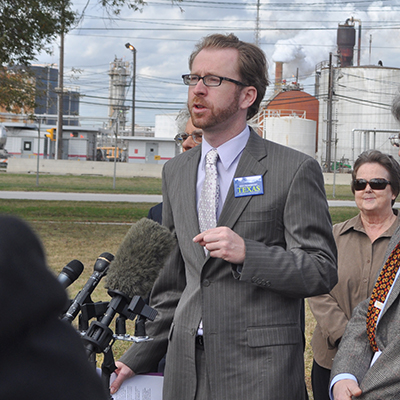
How we got the Texas Legislature to invest $1 billion in state parks
It took a big idea, reaching across the political divide, and a little bit of luck

This spring, in the biggest win in my twenty-five-year career of environmental advocacy, the Texas Legislature voted overwhelmingly to invest $1 billion to create new state parks. If approved by voters this November, that would represent the biggest investment in nature in Texas history.
The Texas Legislature has long pinched pennies when it came to our parks. So how’d we do it? Pull up a seat around the campfire and I’ll tell you the tale.

My family at Garner State Park last ThanksgivingPhoto by Luke Metzger | Used by permission
The fight for the sporting goods sales tax
Only about 2.4% of Texas land is protected as state and national parks. Even those few acres suffer from chronically insufficient funding for basic purposes such as maintenance and operations.
When Environment Texas was founded in 2006, our first campaign was working to ensure stable funding for the state parks. Over the next thirteen years, we worked alongside parks advocates like George Bristol, Andy Sansom, Joseph Fitzsimons and many others to make sure the Texas Parks and Wildlife Department (TPWD) had the funds they needed.
It was a rollercoaster ride. We won a threefold increase in funding for state parks in the 2007 session. But in 2011, and again in 2013, TPWD warned that proposed budget cuts would force them to close as many as 20 state parks. Both times we campaigned, and both times we were successful in our efforts, to help keep the parks open and even saved a grants program that supports local parks.

We joined (from the left), Sen. Kirk Watson (D – Austin), Sen. Craig Estes (R – Wichita Falls), and Rep. Lyle Larson (R – San Antonio) at a press conference in 2013 in support of state parks fundingPhoto by Staff | TPIN
When the Legislature voted in 2019 to propose a constitutional amendment (Prop 5) to guarantee that sales taxes on sporting goods would go to our state parks, we campaigned to pass it on the state ballot.
Million Acre Parks Project
But over all those years, we knew it wasn’t enough to just maintain our existing parks; we needed more parks. A 2001 report by Texas Tech for TPWD estimated that the state needed to add 1.4 million acres of state parks by 2030 in order to meet demand for recreation and ecological needs. An open records request revealed that as of 2021 the state had added only about 200,000 acres of parkland since that 2001 report was written – land acquired thanks to donations, private philanthropy, and federal grants, but with little state money invested.
We knew that to change the trajectory, we’d have to do something big and bold, but if we had public support, we could prevail. So we decided to call for the state to invest $1 billion to help fund the acquisition of an additional million acres of state parks.
Given the state’s past history, it’s perhaps understandable that even some fellow conservation advocates balked or laughed at the bold ask. I was told it was too soon to call for a historic investment in parks and should instead defer to TPWD and rally behind whatever modest conservation funding request they made. And given the Legislature had finally increased funding through Proposition 5 just in 2019, we certainly shouldn’t ask for more money for state parks so soon, lest we be seen as ungrateful.
A legislative staffer even emailed me to say $1 billion was “an unrealistic pie-in-the-sky ask” and urged me to “develop a legitimate and sustainable and realistic plan that’s closer to $75-150 million.”
All this gave us pause. Aside from a small grant from the Earl C Sams Foundation for research, we had no money to ramp up this campaign. Very few conservation groups were supporting us. And when we had asked lawmakers to invest $300 million in land acquisitions when they met in a 2021 special session to decide how to spend $15 billion in federal COVID relief funds, the legislature ended up giving exactly nothing to the parks. There were strong reasons to drop the idea – or significantly whittle down our ask.
But after careful thought, we decided that aiming high was the right plan.

Supporters at our booth at the EarthX event in Dallas in April 2022Photo by Staff | Used by permission
We knew that the centennial of the state parks system would help us highlight the importance of the state parks. We knew that, with a $32 billion budget surplus, the state had money it needed to decide what to do with. And polling from Texas 2036 had found that 73% of Texans supported using $1 billion of the surplus to create new state parks.
I had met with staff for the Governor, Lieutenant Governor, and Speaker and a number of other legislators and testified before the House Culture, Recreation and Tourism committee and before the Legislative Budget Board and received a positive response from them.
And we knew that Lt. Gov Dan Patrick, who controls the state senate, was proud of his work on the state parks. The only time I ever met him, he reminded me that he was the first lieutenant governor to ever fully appropriate sporting goods sales tax revenues to the state parks.
So the conditions were favorable, but we still needed to mount a major campaign to have a chance of winning.

Canvassing door to door for state parksPhoto by Luke Metzger | TPIN
Our plan to win
First, we needed to make the case that Texas actually needed more parks. After all, with the passage of Prop 5, the perception among some state legislators was that state parks had been taken care of. Indeed, in the 2021 session, the Legislature appropriated $7 million for land acquisition, the first time in decades that they had given any money for that purpose (aside from money for Palo Pinto Mountains State Park, but that money was raised from the sale of Eagle Mountain Lake State Park, not new money).
So we did research to help make our case for an expansion of the state parks system. We collected data from a variety of sources, including TPWD and the National Association of State Park Directors, and put together some key facts:
- The state’s rapid growth means we’re losing open spaces to new development at a rate of nearly 20 football fields per hour.
- Texas ranks 35th in the nation for per capita state park acreage, behind Florida, South Carolina and Kansas. (This statistic ended up being repeatedly used by Texas Parks and Wildlife Commission chairman Beaver Aplin and others over the course of the campaign.)
- Texas has 54% fewer acres of state parks per capita than Florida.
- During Memorial Day weekend of 2021, 95% of state park campsites were claimed and 86% of all state parks were completely booked. That means many more Texans were turned away when they wanted to spend time in the Great Outdoors.
We also collected anecdotes from Texans to personalize these numbers:
- “Inspired by the promotion to spend New Years Day at a park, our family of four drove the 2 hours from Austin to Enchanted Rock and were turned away.”
- “Colorado Bend State Park. Too many times to count we missed out on getting a campsite even months in advance because they were all booked. We are now in the habit of planning camping trips 6-9 months out, which is really preposterous if you think about it. Sometimes we end up having to cancel because of conflicts that come up in the half year that happens between reservation and trip.”
- “Our family loves going to many of our state parks at least twice a year. We’ve experienced long waits at Garner, Pace Bend, and others, especially during peak times, which has caused us to plan trips far in advance and during off-season. Sometimes we’ve needed to use PTO to go on weekdays because the weekends are all booked.”
We put all of what we learned into a report, A Most Valuable Legacy: Investing in the next 100 years for Texas’ state parks system.
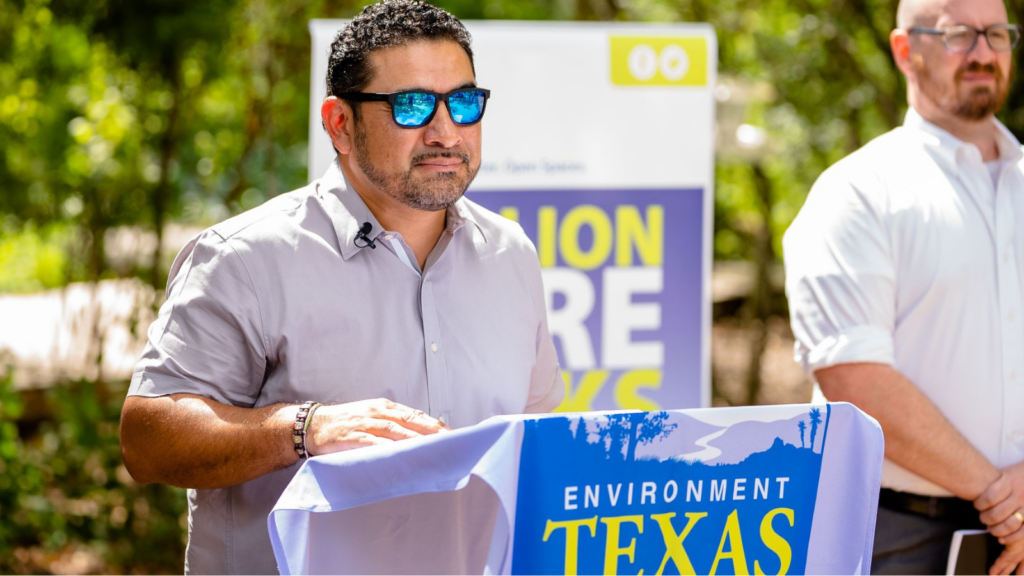
Rep. Armando Walle speaks at a Houston press conference to release our reportPhoto by TejProductions | Used by permission
Building bipartisan support
We knew that to have a chance of winning, we needed help from someone who held sway with the legislative leadership. That person turned out to be conservative activist and GOP donor Doug Deason.
I had first interacted with Doug on Twitter, where we sparred civilly about the impact of wind power on birds. So I knew we didn’t agree on energy policy, but I had a hunch he might support our Million Acre Parks campaign. In the spring of 2022, I sent him a direct message through Twitter.
Doug was immediately enthusiastic and we set up a call to discuss the effort. He agreed to join the steering committee of the Million Acre Parks Project, alongside Oscar-nominated actor Ethan Hawke, best-selling author Douglas Brinkley, former elected officials like state Sen. Kip Averitt (R ) and Land Commissioner Garry Mauro (D), and leading conservationists like George Cofer, Ann Hamilton and Jarid Manos.
When I let Doug know that we were organizing a media briefing on the campaign, he reached out to Tan Parker (R – Denton), then a state Representative and soon to be a state Senator, to invite him to speak at our webinar and to carry the bill.
Sen. Parker told the Waco Tribune Herald, “the two of them came to me, and I said, ‘Guys, I love this. I love the idea of doing something big on the 100th anniversary. The three of us put our heads together and brought together an incredible coalition.”
Our media release was widely covered in the media, including in the Houston Chronicle, the Dallas Morning News, NPR (which ran on stations around the state), and Spectrum News. We also wrote op-eds which ran in the Houston Chronicle, Waco Tribune-Herald, the Beaumont Enterprise and the Fort Worth Star-Telegram. Doug Deason co-wrote an op-ed with me in the Dallas Morning News. Ethan Hawke shared a link to our campaign with his one million followers on Instagram.
Working with Sen. Parker, we decided to propose an amendment to the constitution (SJR 74), where the money would sit outside of the general revenue process and thus not be subject to spending caps – or raids on the fund by future Legislatures. But that came with a challenge: we’d need to get votes of two-thirds of members in each legislative chamber to pass an amendment, not just the usual majority vote that other bills require.
We built a coalition of groups to support the campaign, including the Great Plains Restoration Council, Sierra Club, Defenders of Wildlife, Environmental Defense Fund, Clean Water Action, the Access Fund, Texas 2036, the Greater Edwards Aquifer Alliance, Save Barton Creek Association, Bike Texas, Farm & City, and Austin Outside.
Doug’s lobbyist Justin Keener provided strategic advice and helped Doug maintain a steady drumbeat of communications to key legislators. Houston activists Molly Cook and Michael Moritz worked the Houston delegation to build support. Budget expert Cyrus Reed of the Sierra Club kept careful track of the appropriations process and was one of just a few people who testified in support when the bill was heard in committee. Members of the Alliance for a Clean Texas lobbied on the bill during their biennial Lobby Day.
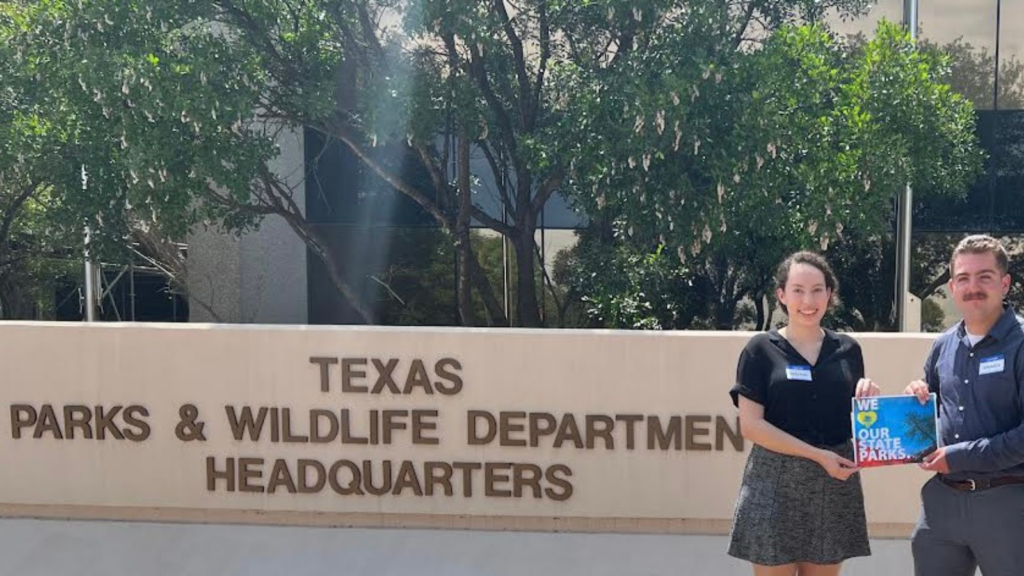
Interns Mimi Okhuysen and Sam Berman after testifying at a meeting of the Texas Parks and Wildlife CommissionPhoto by Luke Metzger | TPIN
Environment Texas also engaged the public directly, collecting petitions door to door, online and at public events, producing a video about the campaign, and turning out volunteers to testify at meetings of the Texas Parks and Wildlife Commission, urging the politically influential Commissioners to work to secure more funding for land acquisition.
But we would have gotten nowhere if it weren’t for Doug. He continued to reach out to elected officials. He texted Lt. Gov Dan Patrick, who told him he “liked the idea.” He joined me for lobby meetings with other legislators and continued to stress how important this initiative was. At one point during the session when I was uncertain whether we were going to win and contemplated lowering our ask, Doug urged me to stay strong and keep pushing for the $1 billion.
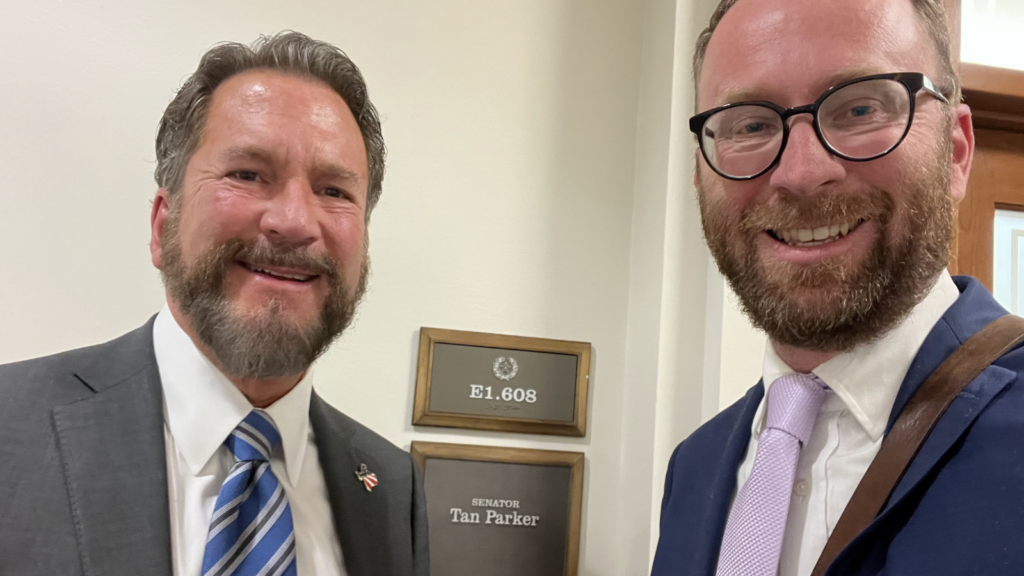
Me and Doug lobbying for the Centennial Parks Conservation FundPhoto by Luke Metzger | TPIN
Momentum to victory
The Dallas Morning News caught wind of what they saw as unlikely cooperation between an environmentalist and a conservative activist, and wrote a front page story that further boosted visibility.
We got a few other boosts along the way.
Governor Abbott, in a speech at an event celebrating the state centennial, called for an expansion of the park system, saying “Yes, we want Texas to grow. Yes, we want Texas to prosper. But we can do that while at the very same time conserving the beautiful parks that we have and adding to them to make Texas even more appealing to future generations.” He backed that up in his budget proposal, recommending the Legislature “make additional investments to meet growing demands and to further develop our state park system.”
Another important moment was when Fairfield Lake State Park was sold to a real estate developer. The deal by the power company Luminant (which leased the land to the state for the park) ignited a fury among state lawmakers. The fight to save Fairfield Lake State Park continues, but the possible loss of the park – during the centennial no less – felt like an insult to the public, and reminded legislators how important it was to invest in the parks.
Sen. Parker and Rep. Walle worked tirelessly behind the scenes for the bill, lobbying the legislative leadership and their colleagues to stay strong and call for $1 billion for parks. They earned the critical support of Lt Gov. Patrick, Speaker Phelan, Senate Finance Chair Huffman, and House Appropriations Chair Bonnen.

Me and Sen. Parker after strategizing on the billPhoto by Nell Carroll | Used by permission
The bill ultimately passed with overwhelming support from Republican and Democratic lawmakers alike, and Governor Abbott signed it into law.
The new Centennial Parks Conservation Fund, if affirmed by voters this November, will help create dozens of new state parks, preserving land for wildlife to live and people to enjoy.
As I told a Senate committee in testimony, “this is an opportunity for a new golden age of park acquisition for the state of Texas. That would be a perfect birthday present for the parks’ centennial.”
So, why do I call this the biggest victory of my 25 years of public interest advocacy? Three reasons: One, Texas is a land of open space and that’s important to all of us – the people and the wildlife. Every bit of land that we can conserve makes a difference. Two, this victory had broad bipartisan support; all sides can claim it as a victory, which makes it more likely that support for the parks will be affirmed and reaffirmed over time. Three, I believe that a healthy environment depends on Texans finding ways to work together, across partisan lines. I’m proud to have put that principle to the test, and I look forward to more opportunities to find points of connection with people who aren’t yet friends, to make a difference for the state I love.
Topics
Authors
Luke Metzger
Executive Director, Environment Texas
As the executive director of Environment Texas, Luke is a leading voice in the state for clean air and water, parks and wildlife, and a livable climate. Luke recently led the successful campaign to get the Texas Legislature and voters to invest $1 billion to buy land for new state parks. He also helped win permanent protection for the Christmas Mountains of Big Bend; helped compel Exxon, Shell and Chevron Phillips to cut air pollution at four Texas refineries and chemical plants; and got the Austin and Houston school districts to install filters on water fountains to protect children from lead in drinking water. The San Antonio Current has called Luke "long one of the most energetic and dedicated defenders of environmental issues in the state." He has been named one of the "Top Lobbyists for Causes" by Capitol Inside, received the President's Award from the Texas Recreation and Parks Society for his work to protect Texas parks. He is a board member of the Clean Air Force of Central Texas and an advisory board member of the Texas Tech University Masters of Public Administration program. Luke, his wife, son and daughters are working to visit every state park in Texas.
Find Out More
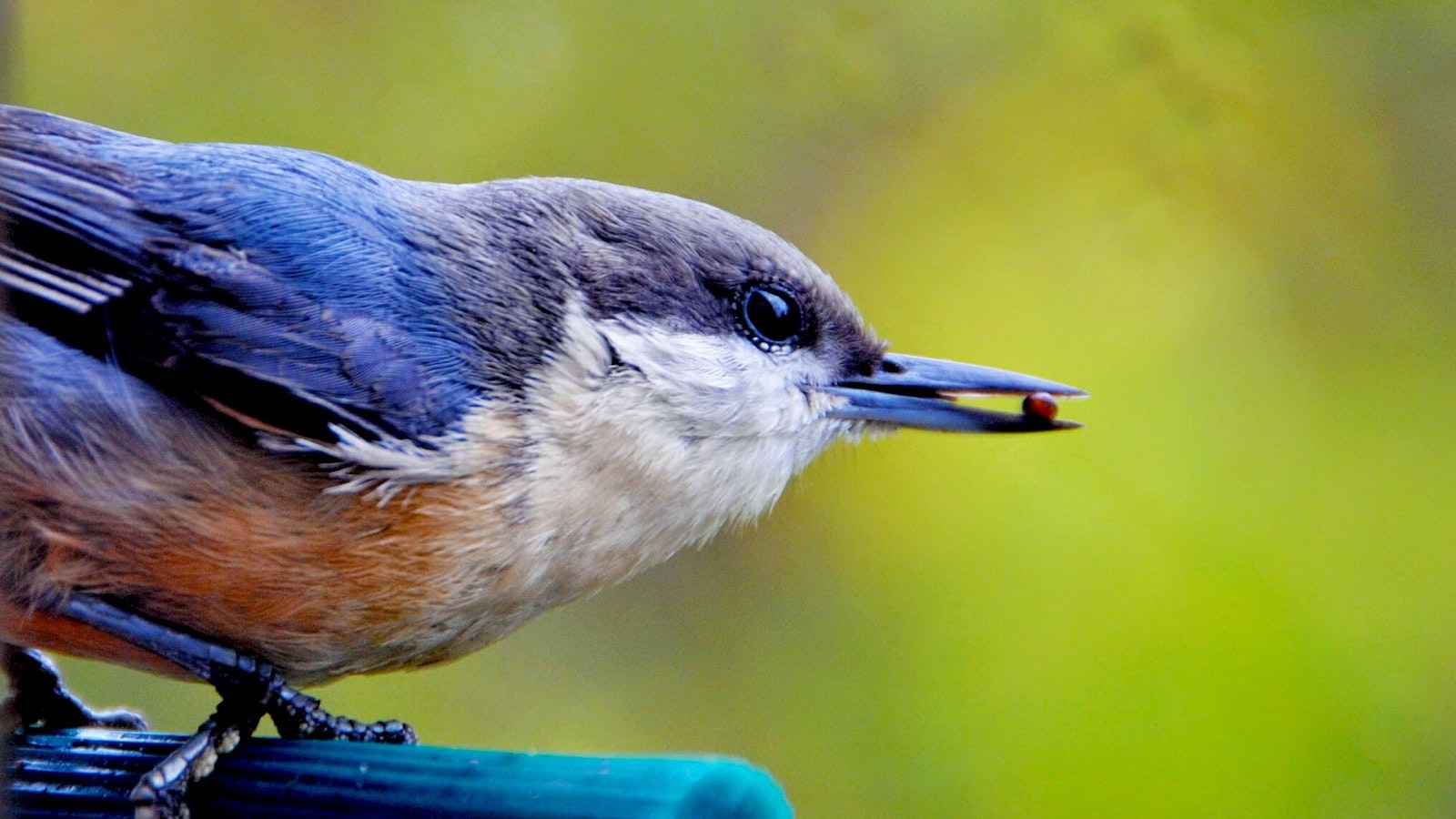
EPA report says pesticides endanger wildlife
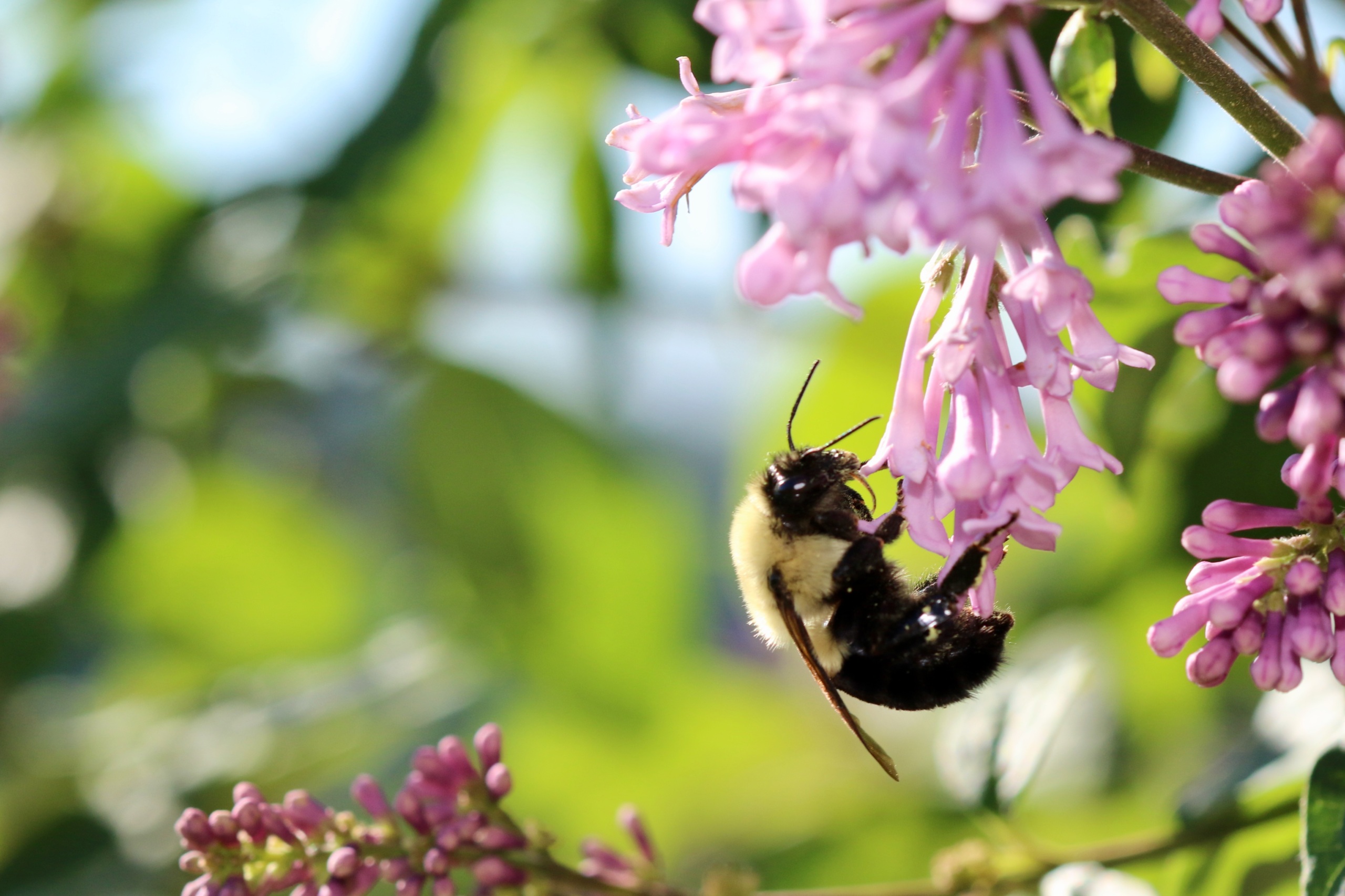
Why we should save the bees, especially the wild bees who need our help most
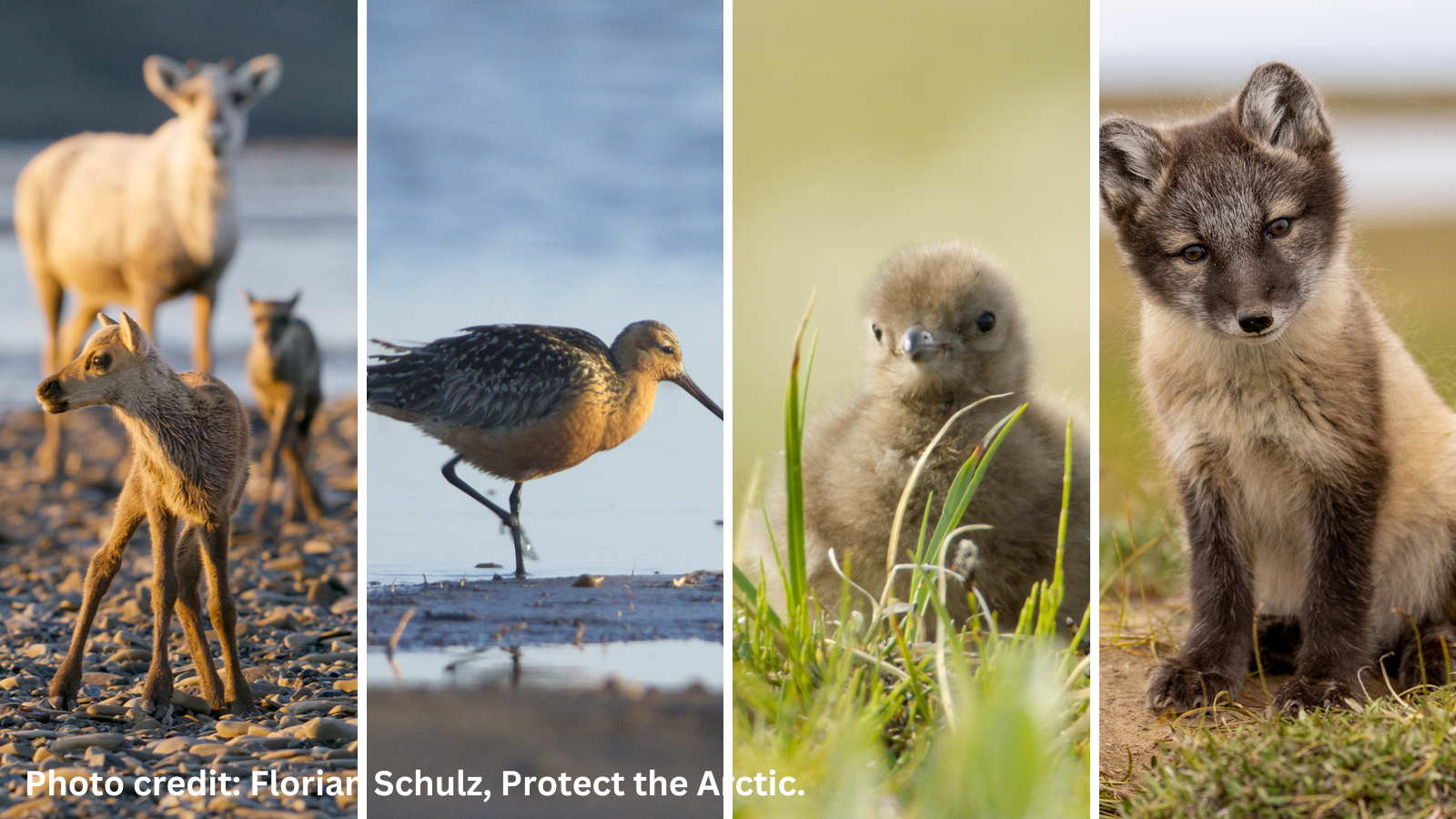
Why Alaska’s NPR-A, site of the Willow Project, deserves protection

